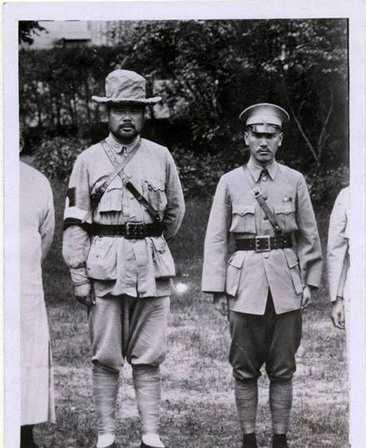
In mid-May 1929, Feng Yuxiang's Northwest Army generals held a military conference in Huayin, Shaanxi Province, and decided to preemptively oppose Chiang Kai-shek's policy of "cutting the domain" by force; on the 16th, the 400,000 Northwest Army officially changed its name to the National Salvation Army and rebelled against Chiang Kai-shek. At this time, Chiang Kai-shek's Central Army had just experienced the Chiang Kai-shek War and had not yet taken a break, and although it had hastily gathered 360,000 troops, its combat effectiveness was far from being comparable to that of the hard-working Northwest Army.
The Northwest Army was defeated
However, in just 11 days, the Northwest Army was completely defeated, and Feng Yuxiang was forced to leave the northwest with his wife and children, and was placed under house arrest by yan Xishan, the new "Northwest Propaganda Envoy", near his hometown in Wutai County. In fact, before it could formally engage the Central Army, it disintegrated from within, and its generals Han Fuyu and Shi Yousan led 100,000 elite defections; Yang Hucheng's Shaanxi Army, Ma Hongkui's Ningxia Troops, and other local factions sent telegrams to rebel against Feng and Jiang, resulting in a great loss in Feng's strength and an enemy in his belly and back.
Feng Yuxiang's Northwest Army has always been known for its bravery and good fighting, and after the Northern Expedition began, it successively occupied Henan, Shandong and other provinces, and its strength was further expanded. Why, then, did his generals and the local factions they had annexed turn their backs on in just 11 days? In fact, this is all due to the weak economic foundation.
Gansu, Shaanxi Province, suffered from drought
Shaanxi and Gansu provinces were important foundations for the Northwest Army, but from the autumn and winter of 1927 onwards, the two provinces suffered severe drought. In 1928, the precipitation in Gansu Province was less than 30% of that of previous years, 40% of the land could not be planted during the spring ploughing season, 65 of the 78 counties in the province were affected, and more than 2.5 million people were affected. From March 1928 in Shaanxi Province, it did not rain for half a year, "the trunk of the tree died, and the grass seedlings withered." 75 of the province's 92 counties suffered disasters; in 1929, 2.5 million starving people died in the province, and more than 400,000 people fled the province.
The drought caused severe famine in the areas controlled by the Northwest Army, depriving them of the material and human base on which they depended. In order to maintain the huge scale of the Jiang-Feng War, it was only possible to continue to set up a name and collect harsh taxes and miscellaneous taxes. In 1929, the land silver of the 12 counties in Hanzhong increased by 4 times, and with the addition of various donations, the land tax silver was more than 10 times that of the previous year. In 1929, Weinan County was pre-enlisted to 1932, and Fengxiang County was pre-enlisted until 1938. In the relatively rich Guanzhong Plain, each county has to bear more than 1,500 oceans of supplies per day, which is not counting military food and horse grass. The heavy burden made it difficult for all localities to bear it, and coupled with the co-optation of Chiang Kai-shek, all local factions turned against each other and were unwilling to continue to follow Feng Yuxiang's path to the black.
Looting everywhere stirs up resentment everywhere
After the Northwest Army captured Henan and other newly occupied areas, the raid became even more severe, even to the point of "fishing in the waters." Taking the military station in Xi'an County, Luoyang City, as an example, at the beginning of its establishment, it required the local government to pay 100,000 catties of wheat, 500,000 catties of millet, more than 800,000 catties of miscellaneous grains, and 1.9 million catties of grain and grass and 1 million catties of firewood; the local carts and livestock were also robbed, and the merchants were extorted 15,000 oceans of "military expenses."
At that time, many places in Henan were also severely drought-stricken and the people were not happy, so they had to raise funds to buy grain from the northeast and other places to save their lives, but once these grains passed through the northwest military defense zone, it was like "meat buns beating dogs -- there is no going back." In May 1929, the "Declaration" disclosed that "2280 tons of grain, 144890 bags of flour, and 250 boxes of biscuits were shipped to Kaifeng, Lingbao, and part of Shaanzhou, all of which were used as military salaries by Feng Jun."
The deterioration of the economic situation has led to the long-term arrears of military salaries in the Northwest Army, and the usual meals are also "to send meals to the local people, no matter what the bran vegetables, what to eat." In contrast, its opponents, the Central Army, were well fed, and when the two sides faced each other, they shouted, "You are suffering, come here." Our pay is all big ocean money! This silver bullet directly destroyed the fighting spirit of the Northwest Army.
For more exciting content, come and watch the 10,000 books break the waves